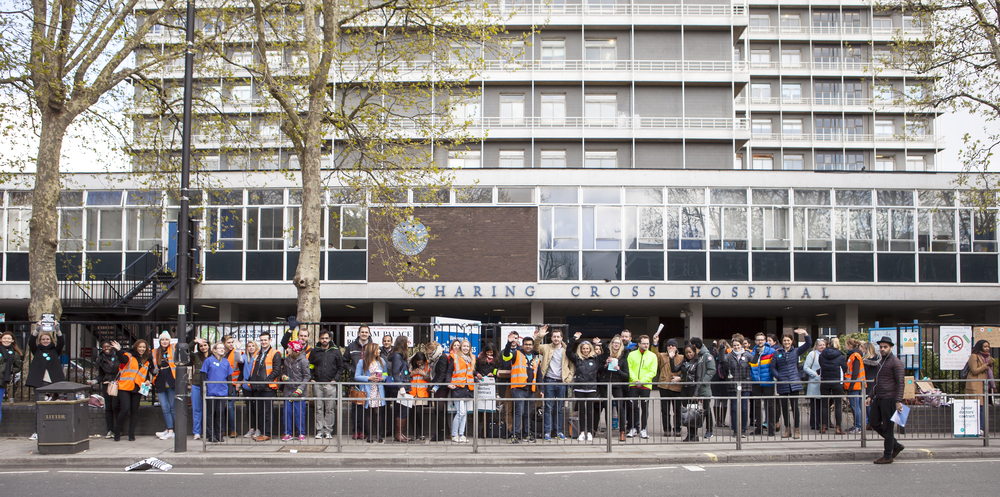Signs of dislocation and chaos continue in North West London after the flagship “Shaping a Healthier Future” project – which had threatened to close A&E and acute services at Ealing and Charing Cross Hospitals – was belatedly scrapped by Matt Hancock in April.
The Clinical Commissioning Groups remain mired in debt, entering 2019/20 with an underlying deficit of £99.6m, while many of the main NHS and foundation trusts are also deep in the red.
A leaked “crib sheet” drawn up to supply senior managers with prepared answers to difficult questions about the collapse of the plan, which wasted over £230m, has revealed that even NW London communications supremo Rory Hegarty has been unable to suggest convincing replies to some questions, such as “How will you change the way you make decisions in future to ensure millions more pounds of taxpayers money isn’t wasted?”
The crib sheet is consistent in offering no apology for the fiasco, and in giving a flat “No” to the question on whether anyone responsible will resign.
Citizens Panel
Instead the management team that so conspicuously failed to consult or engage with affected communities or boroughs in during most of the 7 wasted years of the project have been trying this year to reinvent themselves as advocates of a new “Citizens’ Panel” to “to support, comment on and develop our thinking on a range of healthcare issues”.
When this idea was first floated at the end of February 2019 it was proposed as an enormous 4,000-strong body – 80 times larger than the NHS Assembly established in the spring.
Where the Panel might meet or how it might function was not explained.
However it seems that senior managers have already got cold feet over this idea. By May 2019, plans for a single Clinical Commissioning Group to cover the 2.2 million population of NW London across 8 boroughs claimed less ambitiously: “we are putting in place a 3,000-strong Citizens’ Panel across NW London – a demographically representative group from which we will regularly seek feedback.”
Campaigners point out that if the current rate of shrinkage (25% in 4 months) continues, mathematically there will be no membership left for the ‘panel’ by February 2020. Perhaps this is why nobody has sent out any invitations for people to join it, and no dates or venues have been announced for meetings?
Away Day
Meanwhile efforts to engage with staff in the 8 CCGs which are set to be streamlined down to just one have proved less than a roaring success.
Details have been leaked of an ‘away day’ which over 500 staff were required to attend, where management – (perhaps unwisely) arranged for staff to be able to text or email live feedback and questions on their presentations.
Although only the feedback has been leaked, it appears few if any of the questions raised in this way were answered by the panel on the platform.
Indeed far from pulling the team together, the event seems to have underlined the divide between staff and senior management, headed up by NW London ‘Accountable Officer’ Mark Easton, who appears to have adopted a prudently low profile as the event went belly-up, prompting repeated questions of why he was not answering points raised.
Management read out tedious and previously scripted answers to the questions they imagined staff might ask, but failed to answer the most commonly asked questions – on how many jobs would be lost in the process of merging the CCGs, and what terms would be offered to staff.
Nor did they respond to any of the questions on the collapse of the SaHF project and the money wasted on it.
Frustration
Many of the questions and comments highlighted staff frustration and anger at inflated salaries paid to management consultants and “interim” staff, some of whom had stayed on for months or years, as well as fears that job losses will be largely among lower ranks of staff with those at the top clinging on, anger over bullying, and a general sense of lack of management competence: “Why are there so many Project Managers paid ridiculous amounts of money who don’t deliver their projects successfully but then get assigned to another project?”
The tenor of the feedback to this morale-raising exercise suggests a worrying level of cynicism and disaffection among the CCG staff who are supposed to plan and commission health care in NW London.
It seems that rather than draw up plans for an imaginary Citizens Panel of thousands, and creating platforms for them to rehearse their set speeches, NHS bosses would do better to start by listening to their own staff and responding to the questions they are actually asking.
Dear Reader,
If you like our content please support our campaigning journalism to protect health care for all.
Our goal is to inform people, hold our politicians to account and help to build change through evidence based ideas.
Everyone should have access to comprehensive healthcare, but our NHS needs support. You can help us to continue to counter bad policy, battle neglect of the NHS and correct dangerous mis-infomation.
Supporters of the NHS are crucial in sustaining our health service and with your help we will be able to engage more people in securing its future.
Please donate to help support our campaigning NHS research and journalism.



Comments are closed.